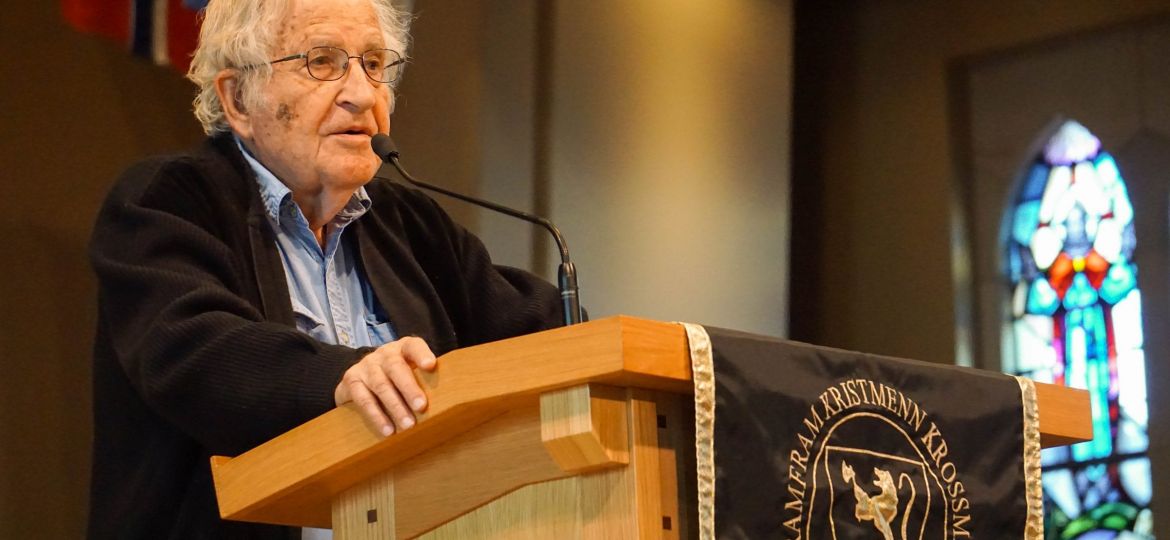
Famed scholar covers threat of nuclear weapons and climate change
Famed linguist, philosopher and political activist Noam Chomsky gave a speech in Boe Chapel on Friday, May 4, calling upon younger generations to address the existential threats facing humanity, and putting forth some ideas for averting catastrophe. Appearing as the Political Awareness Committee (PAC) spring speaker, Chomsky elaborated on the growing threat posed by nuclear proliferation and climate change, and issued an urgent call for increased diplomacy and adherence to international law as means of preventing disaster.
“I thought what I would do … is to focus on just one question, the most important question that’s ever been asked in human history,” Chomsky said. “The question is whether organized human life will indeed survive.”
Chomsky began his speech by articulating the threat posed by nuclear weapons and climate change, focusing first on a number of chilling anecdotes in which the the world almost stumbled into nuclear armageddon.
“Repeatedly, we have come very close, ominously close to terminal disaster,” Chomsky said. He recounted an especially jarring example of one such close call in 1960, when the U.S.’s missile detection system alerted leaders that the Russians had launched a missile attack. Thankfully, the leaders suspected it was a false alarm and later discovered a problem with the machine’s radar.
Chomsky went on to detail the worsening condition of Earth’s climate, citing several recent findings which highlight just how dire the situation is becoming. One article from the journal Science finds that even low-end estimates of temperature increases threaten to trigger the release of massive amounts of greenhouse gases currently trapped in the arctic permafrost. This could in turn speed up temperature increases, melting polar ice and other processes already underway.
Despite the gravity of the situation, the U.S. federal government is currently refusing to take action to reduce carbon emissions and embrace clean energy.
“Our federal government, for which we are responsible, is dramatically leading a race to destruction while we sit and watch,” Chomsky said. “It is astounding, as is the lack of attention, another doubly terrifying phenomenon. We should be asking, among other things, what this tells us about our society, and about our culture, what we’re immersed in.”
After illustrating the nature and severity of nuclear proliferation and climate change, Chomsky outlined some possible solutions and put forth a case for optimism.
“There are very plausible answers in every single case that exists,” Chomsky said. “Diplomatic options are always open, and there are quite straightforward general principles that can be quite effective. One principle is simple: obey the law.”
Chomsky went on to note that Article 6 of the U.S. Constitution stipulates that all valid treaties are the law of the land.
Chomsky argued that, because of Article 6, the U.S. repeatedly violates the United Nations’ charter and heightens the risk of nuclear conflict when it threatens to use military force.
“Article 1 of the charter requires us to keep to peaceful means to resolve international tensions and disputes, and to refrain from the threat or use of force in international affairs,” Chomsky said. “And I stress ‘threat’ because that is violated all the time, by every president and every high political leader. Every time you hear the phrase ‘all options are open,’ that’s violating the supreme law of the land, if anyone cares.”
Chomsky then gave a number of examples of the U.S. violating treaties it has signed, from imposing sanctions on Iran that violate the Iran nuclear agreement, to ignoring Security Council Resolution 687’s call for establishing a nuclear weapons-free zone in the Middle East.
According to PAC Coordinator Abdul Wake ’19, PAC invited Chomsky because of his celebrated scholarship, unorthodox political views and scathing critiques of power.

Chomsky is currently an Institute Professor Emeritus at the Massachusetts Institute of Technology (MIT) and laureate professor at the University of Arizona. He has written over 100 books, many of which established his reputation as an outspoken critic of U.S. foreign policy, capitalism and the news media.
“Our intention with PAC this year was to sort of facilitate a departure from the dogmatic engagement with politics which represents a very sensationalist, sort of commodified and superficial and, at times, xenophobic engagement with politics,” Wake said. “Our desire was to stress the necessity for a critical perspective built on engaging with uncomfortable truths … we did this by offering a platform for public critique of power.”
After Chomsky’s prepared speech, he answered several questions from the audience on topics such as Islam, white-collar crime, military culture and student loans, answering each question with the unorthodox and critical perspective that reflects his status as such a prominent public intellectual.
carlen1@stolaf.edu




You must be logged in to post a comment.